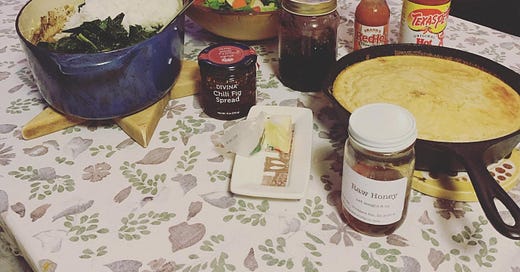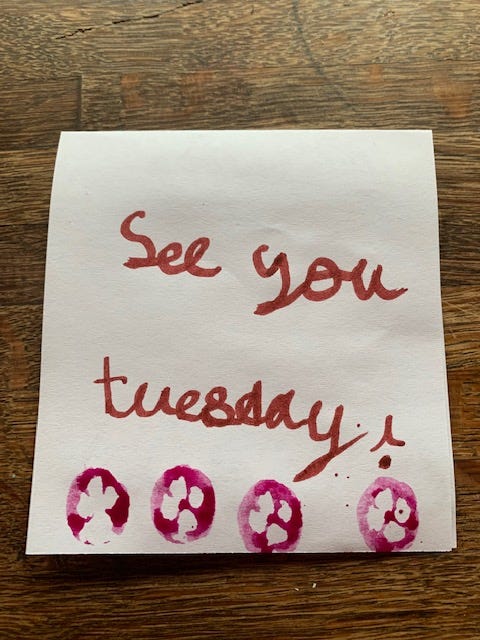I like the idea of a New Year’s experiment more than a New Year’s resolution—especially on this rainy Sunday, with the Omicron surge limiting what we can do and the near certainty that school will be canceled tomorrow for a wintry mix. A resolution sounds like a lot of pressure right now, but an experiment sounds… diverting?
A few years ago my experiment was to hike every day, no matter the weather. I kept it up for a while, but soon enough started missing days. Still, the experiment made a difference, and I definitely hike more in non-ideal weather—in the winter especially—than I used to, which has been great for the kids too.
This year I asked my family if they’d be willing to try a different experiment: becoming weekday vegetarians. I’ve been some version of what my mom and I call “Tidewater Vegetarian” (eating occasional seafood alongside a mostly vegetarian diet) since I was fifteen. Like my mom, I’m the primary cook in a house where I eat one way (Tidewater Vegetarian) and my family eats another (omnivores who eat very little red meat). I don’t mind, usually—I like cooking, and it makes me happy to make things that they like. Before my grandparents died and we stopped eating Virginia ham, I was known as the best country ham slicer in the family, probably because I’m not tempted to eat any.
But, even though it’s possible to eat meat sustainably (especially when you source your food from local farms and avoid beef), we don’t usually get our chicken or pork from the farmer’s market. And I found myself fairly often planning my meal/protein around their meat-based meal—I’d just have an egg/some lentils/a big salad, sort of the way my mom always has.
Then in the fall, I got a copy of Jenny Rosentrach’s The Weekday Vegetarians: 100 Recipes and a Real-Life Plan for Eating Less Meat. This book proposes going meat-free during the week, and eating what you like on the weekends. I showed it to Bea, who sometimes claims to be “a vegetarian who also eats bacon and chicken,” and asked her to bookmark the recipes she wanted to try. She returned the book bursting with sticky notes, which surprised and delighted me. Most of the recipes in the book are very simple to make, taking a half-hour or so, making them ideal for weeknights.
There are lots of good reasons to go vegetarian, or to reduce your meat consumption. Mamie decided to go vegetarian after hitchhiking with her friends Pam and Annie at age eighteen or nineteen. They were picked up by a tractor trailer full of veal calves, and the animals’ pitiful cries made it impossible for her to eat meat after that (fishing the Chesapeake Bay and cleaning the fish with Papa, her dad, convinced her that she could still eat sustainably-caught fish). I stopped eating meat after being served rabbit and paté in France with my friend Corelia, at age fifteen, and deciding that it might be better to just eat the way my mom does. After reading the philosopher Peter Singer in college, I even went vegan for a few years.
In her book’s intro, Rosenstrach says that she knew she wanted to eat less meat because of meat’s impact on the planet, but was motivated into action by her teenage daughter telling her something she learned in earth science: “‘We could basically save the planet if we stopped eating beef.’” Rosenstrach writes:
“I did know that actually, and I’m not proud of what I’m about to say, but there is something that feels way more urgent about a statistic like that when it comes out of the mouths of my own children, the ones who will be inheriting the planet that I have been complicit in neglecting and, let’s be real, destroying. If there is something positive to spin from this, it’s that their generation understands the broader significance of their food choices and is optimistic about making changes in a way that many of their parents are not. They are simultaneously motivated and motivating.”
This is also what motivates me now, more than anything—the immense resources required by meat production, especially cattle ranching, and escalation of the climate crisis. Though some may argue with Peter Singer’s utilitarian belief that animals should have the same rights to bodily autonomy and freedom from suffering as humans, who could argue that eating hamburgers (or steak) is worth clear-cutting the Amazon rainforest? (Or any forest, for that matter?)
My kids are younger, which is why up until now I haven’t proposed going vegetarian. For a long time there’s been a stigma around vegetarianism in this country, especially for vegetarian (hippie) parents who “force” vegetarianism on their kids, who eat weird foods and don’t get enough protein. But in many parts of the world, vegetarianism is just part of the culture, a way of life—including for kids (in India, almost 40% of the population is vegetarian, and there are 1.5 billion vegetarians worldwide). There are plenty of ways to get protein without eating meat, and cookbooks like Rosenstrach’s have terrific strategies for creating “hooks” that will help kids feel excited about a vegetarian meal (we also like Melissa Clark’s Kid in the Kitchen, which is not vegetarian but vegetarian-friendly). When I feel at a loss (what will they eat in general that is not boxed macaroni?), I turn to page 272 in my old copy of Anna Thomas’s The New Vegetarian Epicure, which has a list of simple vegetarian foods kids will almost always eat.
I’m happy to say that Richard and the girls were enthusiastic about this experiment, which I’m hopeful will help the kids investigate why locally-grown plant foods is better for the planet, and also become more adventurous eaters. We’re lucky to have a share in a CSA from In Good Heart Farm. Ben and Patricia (and their two kids) grow a huge variety of beautiful fruits and vegetables, and having a local CSA reduces waste in so many ways (we take our own bags and select veggies from reusable boxes).
Not everyone has a CSA, or the resources to join, and I get that. But eating vegetarian, my mom pointed out, can also be also way cheaper, as long as you plan well (not always easy for me, so that will be part of this process too).
I told Mamie I’d include some of the recipes we like, and here is a protein-packed salad from The Weekday Vegetarians that the girls love (and I love taking to work as leftovers the next day): Crispy Chickpea Caesar Salad.
And just to make it easy, here’s a recipe for the chickpeas, roasted in the oven (the way we make them). We like them as snacks, as a side, and in all kinds of salads:
Crispy Chickpeas
Ingredients
1/3 cup extra-virgin olive oil
3 cups cooked chickpeas or 2 (15-ounce) cans, rinsed, drained and dried on a kitchen towel
Kosher salt and freshly ground black pepper to taste
Optional spice mixture: ¼ teaspoon smoked paprika, ¼ teaspoon garlic powder, 1/8 teaspoon cayenne (I leave out the cayenne for the girls)
Roasting Method
1. Heat the oven to 450 degrees. Line a sheet pan with foil.
2. Toss the oil and chickpeas together on the prepared sheet pan. (Make sure they are evenly coated.) Roast for 30 minutes, until the chickpeas are crispy.
3. Make the spice mixture, if using, by combining the paprika, garlic powder and cayenne in a small bowl.
4. Transfer the chickpeas to a paper towel-lined bowl and lightly blot any excess oil. Toss the chickpeas with a few pinches of salt, black pepper and the spice mixture (or separate them into small bowls and make some spicy, some not).
Do you have any favorite vegetarian recipes? What about New Year’s resolutions—or experiments?
(Pictured at top: our New Year’s day tradional Hoppin’ John—made with Deborah Madison’s vegetarian Southern-style Black-eyed Peas recipe. The girls did not like it very much, to be honest, but they enjoyed the cornbread and salad!)
P.S. Have you noticed that cranberries make great fruit stamps? Just cut them in half, paint them (cranberry-like colors work best), and press into paper like a stamp…
Finally, a joke Richard made up for Bea:
What position does a half-man, half-horse play in baseball?
(First to guess correctly gets an awesome I Read the Frog Trouble Times button courtesy our friends Max and Michael!)






centaur field!i love our game Walkertonia that you guys made for Grampa and me! it is hilarious and fun
and right now the centerpiece of our living room decour!( can i modpodge the box cover?)
Happy New Year to all our frogs and polywogs!
✌️❤️🍀🐸
Happy New Year and lots of love! You have given me food for thought. You are right; no steak or hamburger is worth clearing the Amazon Rain Forest or any other. I think becoming a Tidewater vegetarian who lapses on weekends is doable. Here's to healthier eating and doing a better job of trying to save the planet in 2022! I love you All!
Mamie Buttons, stop beating yourself up for being an enthusiastic FTT subscriber! We love you just the way you are!